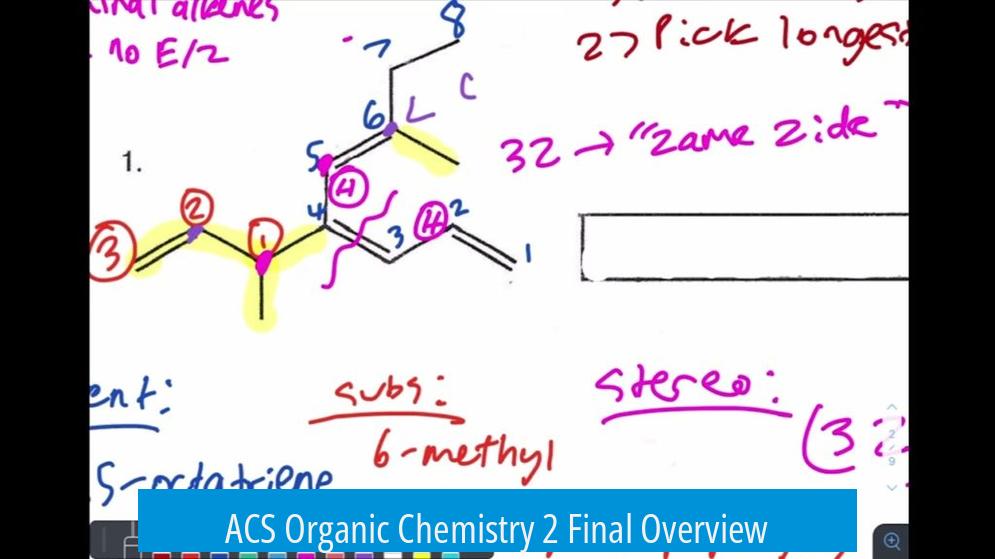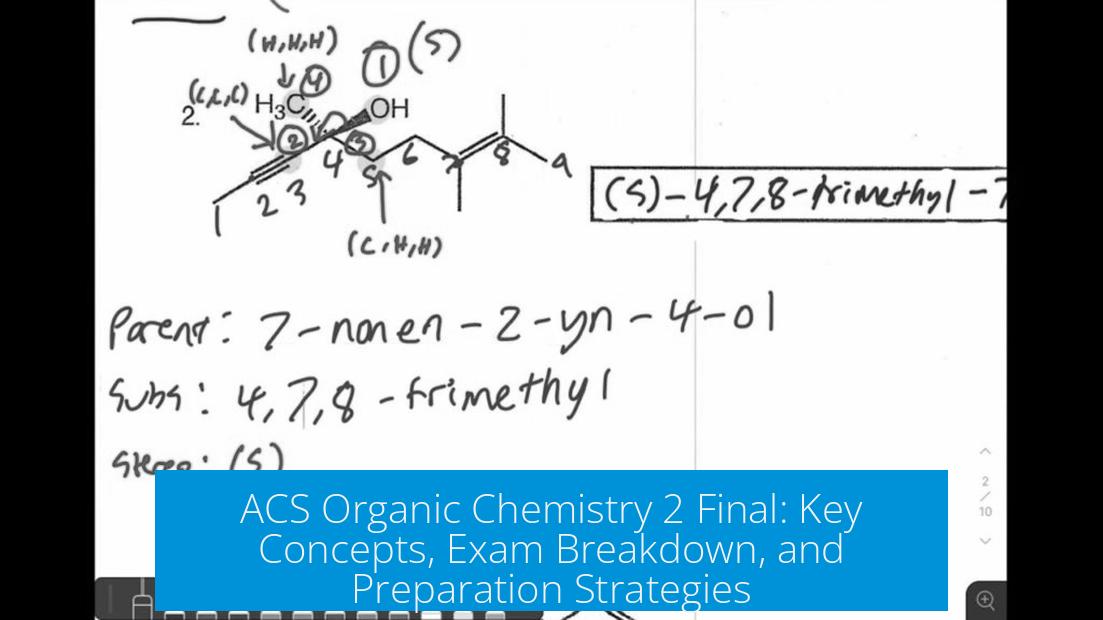ACS Organic Chemistry 2 Final Overview

The ACS Organic Chemistry 2 final exam tests knowledge roughly equally from first and second semester topics, with a heavier emphasis on second semester material. The exam format is standardized and differs significantly from typical course exams. Understanding this format and focusing on core topic areas improves performance.
Exam Content Breakdown
- About 50% of questions test first semester concepts, the other 50% focus on second semester material.
- Common question topics include:
- 5 questions on NMR, mass spectrometry (MS), and IR spectroscopy
- 5 questions on stereochemistry
- 5 questions on nucleophilic aromatic substitution
- 1-2 questions each on SN1, SN2, E1, and E2 reaction mechanisms
- 5 questions on nomenclature
- 5 questions on carbonyl chemistry
- Remaining questions cover various combined topics
Preparation Strategies
- ACS Organic Chemistry Workbook: Essential for review. The workbook contains detailed, topic-organized solutions and mirrors exam-style questions, aiding concept reinforcement and exam familiarity.
- Practice Exams: Previous ACS exams provide valuable practice. Many questions or variants reoccur, so repeated practice enhances readiness.
- Review both semesters but prioritize second semester topics, as they tend to dominate the exam.
Exam Insights and Tips
- The second semester portion often integrates first semester concepts within more complex questions.
- Time management matters: focusing disproportionately on first semester content risks neglecting key second semester material.
- Expect roughly 70% of exam content to reflect Organic Chemistry 2 in some cases, based on reported experiences.
Key Concepts to Master
| Topic | Focus Areas |
|---|---|
| Spectral Analysis | NMR interpretation, Mass Spectrometry, IR peaks identification |
| Stereochemistry | Chirality, diastereomers, enantiomers, optical activity |
| Reaction Mechanisms | SN1, SN2, E1, E2 pathways, nucleophilic aromatic substitution |
| Nomenclature | Systematic naming of complex organic molecules |
| Carbonyl Chemistry | Aldehydes, ketones, carboxylic acids, derivatives, reaction types |
Summary of Important Points
- The exam emphasizes Organic Chemistry 2 topics more heavily but includes first semester concepts.
- Prepare using the ACS workbook and previous ACS practice exams to get accustomed to question style and topics.
- Master key reaction mechanisms, spectroscopy, stereochemistry, and nomenclature.
- Manage study time to prioritize second semester topics without neglecting foundational first semester material.
What is the topic distribution on the ACS Organic Chem 2 Final?
The exam splits roughly evenly between first and second semester topics. About 50% of questions come from each semester, though some focus more on second semester material.
Which types of questions should I expect on the exam?
- 5 questions on NMR, MS, and IR
- 5 questions on stereochemistry
- 5 questions on nucleophilic aromatic substitution
- 1-2 questions each on SN1, SN2, E1, and E2 mechanisms
- 5 questions on nomenclature
- 5 questions on carbonyl chemistry
How can the ACS Organic Chemistry workbook help with preparation?
The workbook provides in-depth answers organized by topic. It familiarizes you with the exam format and question style, aiding concept review and improving test readiness.
Should I focus more on first or second semester topics when studying?
Focus mostly on second semester topics. The final tends to be heavy on Organic Chemistry 2 content, sometimes integrating first semester concepts into those questions.
Are past exams useful for preparing for the ACS Organic Chem 2 Final?
Yes. Many exam questions or similar ones are recycled. Reviewing previous ACS exams helps you understand question patterns and what to expect.





Leave a Comment